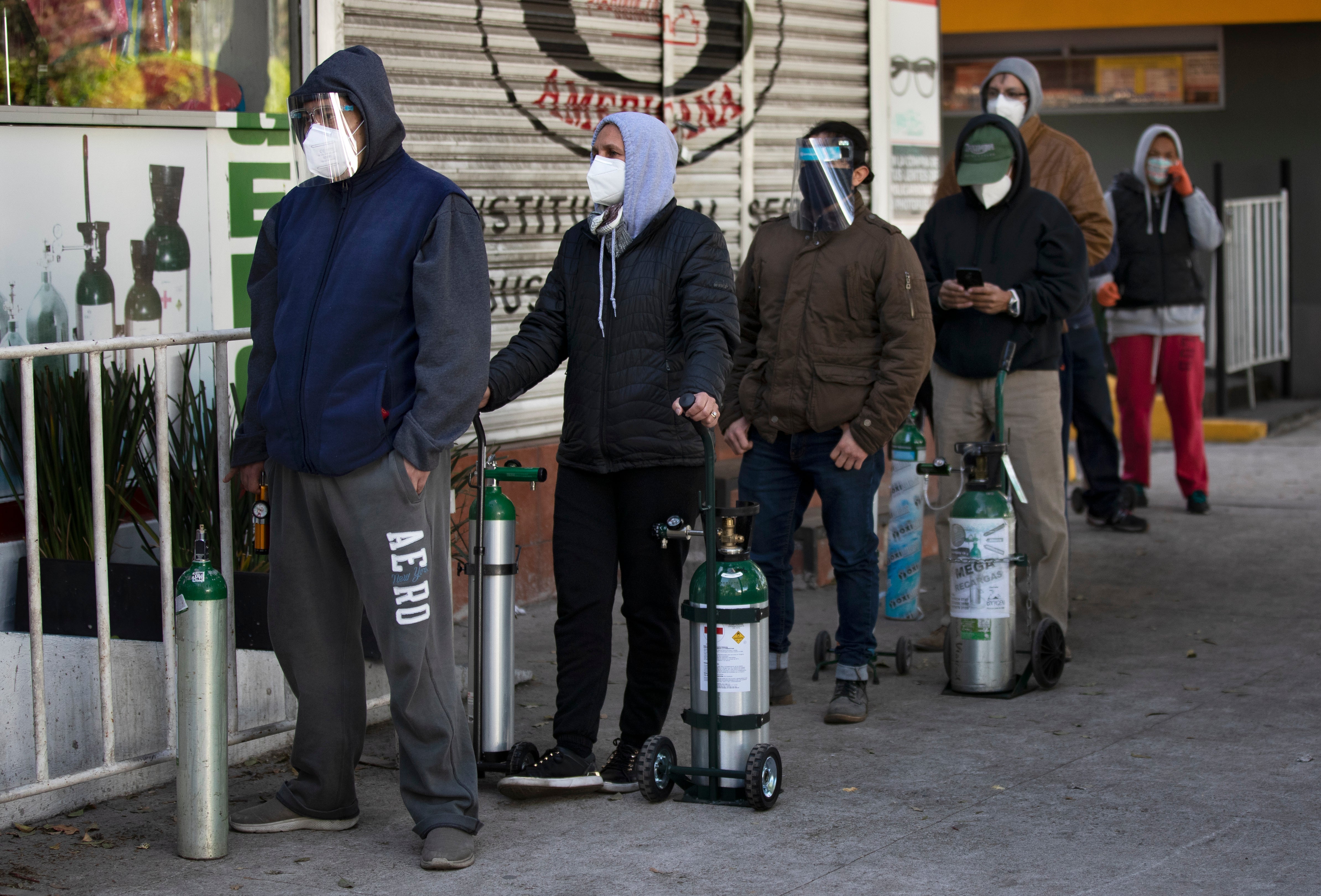Some Mexicans struggle to get oxygen amid virus case surge
Some residents of Mexico City spent New Year's Eve in lines that snaked down a street and around a corner, waiting to refill oxygen canisters for relatives suffering from COVID-19

Your support helps us to tell the story
From reproductive rights to climate change to Big Tech, The Independent is on the ground when the story is developing. Whether it's investigating the financials of Elon Musk's pro-Trump PAC or producing our latest documentary, 'The A Word', which shines a light on the American women fighting for reproductive rights, we know how important it is to parse out the facts from the messaging.
At such a critical moment in US history, we need reporters on the ground. Your donation allows us to keep sending journalists to speak to both sides of the story.
The Independent is trusted by Americans across the entire political spectrum. And unlike many other quality news outlets, we choose not to lock Americans out of our reporting and analysis with paywalls. We believe quality journalism should be available to everyone, paid for by those who can afford it.
Your support makes all the difference.Some residents of Mexico City spent New Year’s Eve in lines that snaked down a street and around a corner, waiting to refill oxygen canisters for relatives suffering from COVID-19.
The city of nine million has seen a surge in coronavirus infections and the city’s hospitals are 87% occupied, straining oxygen supplies.
That has resulted in long lines and price hikes that make it hard or impossible for some to refill tanks that, in some cases, last for only a few hours.
Blanca Nina Méndez Rojas was waiting in line Thursday to refill a tank for her brother, who was recently discharged from a public hospital after contracting COVID-19.
“We just left him disconnected (from oxygen), so he has to stay completely reclined so he won't get agitated or have a problem, until we return with the tank,” Méndez Rojas said, noting “two weeks ago a refill cost 70 pesos ($3.50), and now it is 150 pesos ($7.50).”
In a city where people are afraid to go to hospitals, and where those that will go have trouble finding a bed, it becomes a question of life and death.
Juan José Ledesma, a Mexico City retiree, got sick along with his wife and son. When his test came back positive on Dec. 16, he had to stay home — and consult a private doctor — because the local hospital had no room.
“I have been taking medication prescribed by a private doctor because what happened was we went to a health center and there was no room,” Ledesma said. “There was no room because too many people were coming in" for treatment.
Since then, his son — who recovered — has had to go out three or four times every day to try to refill his father's oxygen tank.
“The price has risen two or three times,” Ledesma said. Reflecting on the problem, he began to weep softly. “I think about rural areas, where things are tougher, tougher, and people have to wait longer, or they really can't afford it.”
Iván, an employee of one oxygen refill store who gave only his first name because his bosses hadn't authorized him to speak to reporters, acknowledged that sometimes there were so many people waiting, desperate for gas, that they couldn't fill all of their canisters completely.
“There are times when we don't have enough oxygen to fill everybody's tanks completely,” he said. “There are times when we have to reduce the refill, so that everybody who is line can at least bring some oxygen home to their relatives.”
To top off the problems, city officials have done little to combat price hikes that doubled or tripled the price of a refill — but they have shut down a black market in which producers of industrial-grade oxygen were selling canisters for medical use. Industrial oxygen, used to operate acetylene torches, is not as pure as the medical-grade gas.
The city government has started a program to give some people oxygen canisters or oxygen concentrators, which are machines that pull oxygen from the air and don't need to be refilled. But there aren't enough to go around, and buying one of the machines on the private market is prohibitively expensive for most families.
Before the pandemic, basic machines started around $900, but prices have since reported risen to $1,500 or more.
“The prices for concentrators have gone through the roof, there has been too much profiteering,” Méndez Rojas said.